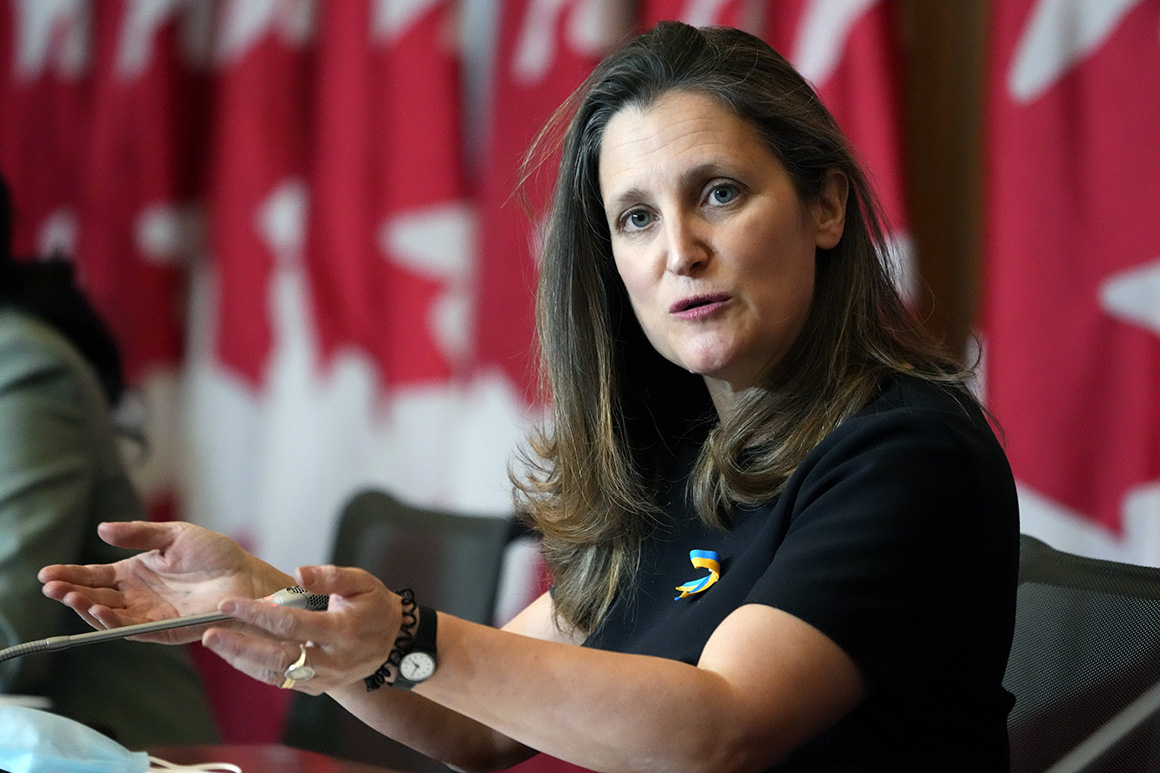
OTTAWA, Ont. — The G-7 is poised to unleash more sanctions against Russia — even at a cost to their own economies, Canadian Deputy Prime Minister Chrystia Freeland said Tuesday.
Freeland, who is also Canada’s finance minister, said she and her G-7 counterparts have discussed the next volley of measures that will target Russia in response to its invasion of Ukraine. She declined to say more, but stressed the actions will be launched in close collaboration with other countries.
“This is not the behavior of a superpower — this is the last gasp of a failing kleptocracy,” Freeland told a press conference Tuesday in Ottawa. “And President [Vladimir] Putin has now become an international pariah.”
Freeland, who worked as a journalist in Russia and the region for years before politics, argued that western democracies have yet to run out of sanctioning firepower.
Domestically, for example, she said officials are studying the holdings of Russian oligarchs in Canada. “We are very aware of the Russian interests in Canada,” she said.
Freeland says the finance ministers discussed the possibility that sanctions will cause collateral damage to G-7 economies. She said the ministers agreed that for the sanctions to be effective, leaders will have to be ready for the adverse consequences at home.
“He wants to behave like a communist dictator,” she said of Putin. “He and his entourage had thought they could do that and continue to enjoy all of the fruits of global capitalism. What the world decided really, really clearly … is you don't get to do that. If you make war on the rules-based international order, we're going to cut you out of the global economy. I don't think that that is the deal that Putin's entourage signed up for.”
Earlier Tuesday, Canada said it will apply more pressure on Russia by pushing for a war-crimes probe.
Foreign Minister Mélanie Joly told reporters in Geneva that Canada was making a formal request to the International Criminal Court to investigate the regime for war crimes and crimes against humanity over its invasion of Ukraine.
Here’s a look at Canada’s response to the crisis in Ukraine.
Sanctions: Canada has announced that it will directly target Russian President Vladimir Putin, Foreign Minister Sergey Lavrov and figures in the Belarusian regime.
Sanctions are also aimed at other top Russian officials — including its ministers of defense, finance and justice.
Members of the Russian elite and their families have been targeted as well as entities such as the Wagner Group, Gazprom and major Russian banks, including Sberbank and VTB.
The Trudeau government has announced sanctions on 351 members of the Russian State Duma who voted in favor of independence for the regions of Donetsk and Luhansk. The list includes hockey legend-turned politician Vyacheslav Fetisov.
Canadians are prohibited from engaging in certain transactions and activities in those territories and from dealings in Russian sovereign debt.
Canada was also supportive of moves by allies to sanction Russia’s central bank and to cut Russia off of SWIFT, a secure messaging system that facilitates communication between member banks.
Lethal and non-lethal aid: The government announced Tuesday a plan to ship 1,600 fragmentation vests and just under 400,000 individual meal packs to Ukraine.
Canada has already shipped C$7.8 million worth of pistols, machine guns, carbines, sniper rifles and ammunition. On Feb. 28, Canada committed to sending at least 100 Carl Gustaf anti-tank systems and 2,000 rockets to Ukraine.
Canada has also sent non-lethal military gear, including helmets, body armor and night-vision goggles. Joly announced Sunday that the government would deliver another C$25 million worth of this equipment.
Earlier Tuesday, the government announced C$100 million in humanitarian assistance to help with the crisis on the ground in Ukraine and those who have fled to neighboring countries.
Troops: Canada has increased its military commitments in the region.
Canada has said it will send up to 460 additional personnel to Europe, adding to the 800 who have been deployed to support NATO. The Canadian military is sending a battery of M777 artillery guns to Latvia, a second frigate to the region and is retasking a CP-140 Aurora long-range patrol aircraft already in the area.
The government has said around 3,400 Canadian Armed Forces personnel are authorized to deploy to the NATO Response Force should they be required.
Defense Minister Anita Anand has also announced two airlifts to the region on CC-130 Hercules with up to 50 personnel who will help with the transportation of goods and troops in support of efforts by Canada and NATO in Europe.
Bans: The Trudeau government announced a ban on oil imports from Russia this week, even though it no longer buys crude from the country.
On Tuesday, Canada said it will ban Russian-owned or registered ships and fishing vessels in Canadian ports and internal waters.
Canada has also closed its airspace to Russian aircraft.
----------------------------------------
By: Andy Blatchford
Title: Canada: G-7 set to launch more sanctions against Russia's 'failing kleptocracy'
Sourced From: www.politico.com/news/2022/03/01/canada-g-7-russia-ukraine-sanctions-00012938
Published Date: Tue, 01 Mar 2022 20:49:37 EST






